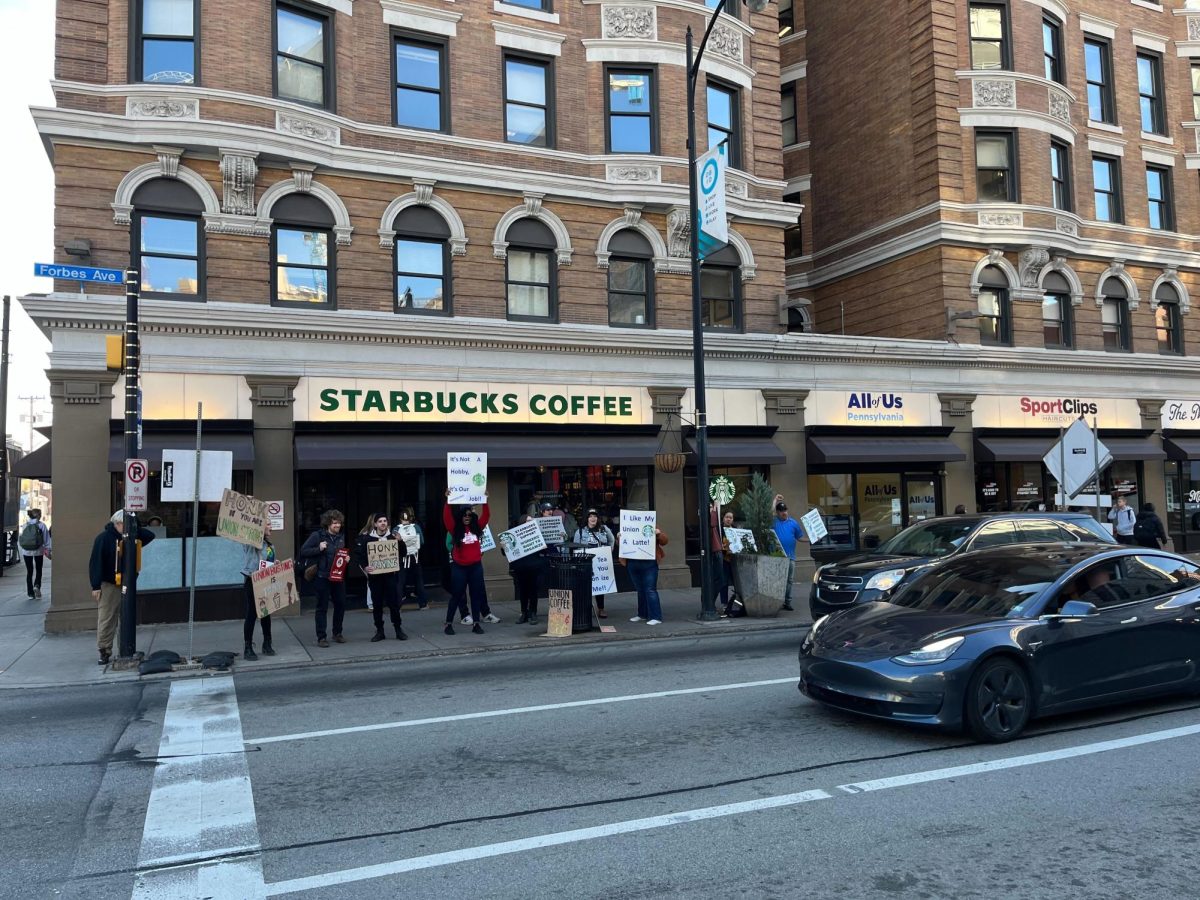Pitt’s Amos Hall Starbucks joined the largest Starbucks strike in history Thursday afternoon in the ongoing battle for workers’ rights.
Starbucks workers from Amos Hall, Craig Street and South Side gathered in front of the Forbes and Atwood Starbucks to protest “Red Cup Day” — the company’s largest promotional day of the year, according to Starbucks employees. The workers, who are part of the national unionization movement among Starbucks employees, said they were striking to demand better pay, fair contracts and adequate staffing.
“Red Cup Day” is an annual nationwide Starbucks promotional event where customers who order a Starbucks holiday drink receive a free reusable red plastic cup with their purchase.
South Side Starbucks employee Abbie Bach explained that Red Cup Day is the main reason workers are striking, stating that the nonunionized Forbes and Atwood Starbucks, which remained open on Red Cup Day, received around 200 drink orders every half hour as a result of the promotion.
“We’re striking today because Red Cup Day is one of Starbucks biggest grossing days of the year and it’s also one of the worst day[s] to work for baristas,” Bach said. “We’re consistently understaffed [and] definitely not getting paid enough for all this extra business.”
Christie Sessa, an employee of the Amos Hall Starbucks which was closed on Thursday, said the promotional event brings in a higher volume of customers which changes the employees’ working conditions.
“They’re doing a unilateral change in our working conditions without our consent, which is illegal under the National Labor Relations Act,” Sessa said.
The Amos Hall Starbucks, which unionized in March 2022, and the Craig Street Starbucks joined other Starbucks stores across the U.S. in closing during the strike day. According to the New York Times, more than 300 of the 9,300 stores in the US are unionized, and employees protested at nearly 200 of these stores.
Amos Hall Starbucks employee Casper Borowitz said the Amos Hall and Craig Street workers voted to strike during Red Cup Day. The nonunionized Forbes and Atwood Starbucks had the opportunity to go on strike but chose not to, according to Borowtiz.
“The Amos and Craig stores all voted to go on strike with a majority to strike,” Borowitz said. “Amos’s vote was unanimous — 24 to zero.”
Bach said the Amos Hall, Craig Street and South Side strikes are part of a wider campaign to advocate for workers’ rights within the Starbucks corporation.
“Starbucks is refusing to bargain with us, which is illegal. It’s been over a year, almost two years now, and we still haven’t had them show up to a single bargaining session,” Bach said.
Sessa said they and other employees have tried to have bargaining meetings with the company, but Starbucks is still unwilling to cooperate.
“When I worked at the store in Bloomfield and we had our bargaining session, our first and so far only one over a year ago now, they walked out after 10 minutes,” Sessa said.
Sessa and their coworker, employee Dustin Ziler, also said some Starbucks management at Pittsburgh stores allegedly pressured employees to reveal information about the strikes.
“They’ve been going around from union store to union store pressuring all the baristas,” Ziler said. “They’re asking, ‘Will you be striking tomorrow?’ which is illegal.”
Ziler added that this response from management could discourage workers from striking, further opposing the employees’ unionization efforts.
“Not only is it none of their business and illegal for them to do, but it puts on-the-fence baristas who are a little bit scared about keeping things from their managers on the red alert, because they’re not aware if they’re going to be in trouble or losing their jobs if they don’t tell their upper management exactly every little bit of information,” Ziler said.
Bach said all she wants is for Starbucks to bargain with its unionized employees and give workers resources to handle the large influx of customers on promotion days.
“There’s just been hundreds of unfair labor practices and National Labor Relations violations that this company has committed,” Bach said. “We want them to just do what they’re legally obligated to do — bargain with us. Give us a fair contract. Staff us adequately and pay us more.”


